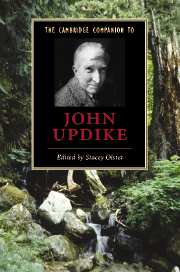Book contents
- Frontmatter
- Introduction: “A sort of helplessly 50’s guy”
- Part I Early influences and recurrent concerns
- Part II Controversy and difference
- 4 Updike, women, and mythologized sexuality
- 5 Updike, race, and the postcolonial project
- 6 Updike, ethnicity, and Jewish-American drag
- Part III American chronicles
- Conclusion: U(pdike) & P(ostmodernism)
- Select bibliography
- Index
4 - Updike, women, and mythologized sexuality
from Part II - Controversy and difference
Published online by Cambridge University Press: 28 August 2006
- Frontmatter
- Introduction: “A sort of helplessly 50’s guy”
- Part I Early influences and recurrent concerns
- Part II Controversy and difference
- 4 Updike, women, and mythologized sexuality
- 5 Updike, race, and the postcolonial project
- 6 Updike, ethnicity, and Jewish-American drag
- Part III American chronicles
- Conclusion: U(pdike) & P(ostmodernism)
- Select bibliography
- Index
Summary
Near the end of John Updike's novel The Centaur (1963), Peter Caldwell contemplates the statue of “a naked green lady” in a pool of water, her lips poised at the scallop shell in her hand (267). Identified a quarter of a century later as a fountain in the Pennsylvania museum the author frequented as a child, this Drinking Girl prefigured the “quiescent glade of basically female forms” he later encountered in the Museum of Modern Art (Looking, 2-5, 14), and she suggests as well his lifelong attraction to the feminine in its archetypal representations. Updike has several times affirmed the mythic resonance of day-to-day experience - most conspicuously in The Centaur, which mythologizes Peter as Prometheus and Updike's own father as the centaur Chiron, but also in the early story “Flight” (1959), where Allen Dow's mother gives “the people closest to her mythic immensity. I was the phoenix” (Pigeon, 58). “[T]o a child,” Updike told interviewers in the 1960s, “everything is myth-size: people are enormous and ominous and have great backlogs of mysterious information”; his recourse to mythic parallels in The Centaur answered, he added, “to my sensation that the people we meet are guises, do conceal something mythic, perhaps prototypes or longings in our minds” (Picked-Up, 499, 500).
As the mythologist Joseph Campbell writes, “It has always been the prime function of mythology and rite to supply the symbols that carry the human spirit forward.”1 While mythological archetypes magnify, however, stereotypes reduce, and the line between them often blurs. Updike’s portrayal of women has accordingly angered some readers as predictably reductive: he “consistently reasserts the worn dichotomy,” Mary Allen complains, “that a woman is sexual and stupid (human) or that she is frigid and intelligent (inhuman).” My thesis in this essay is that Updike’s women do indeed evoke gender patterns archaically entrenched inWestern culture – primarily, it seems to me, the archetypes of earth mother, seductress, and witch. But if the author projects a mythology of women, that mythology turns first on a myth of self, and both run like a double helix through his work.
- Type
- Chapter
- Information
- The Cambridge Companion to John Updike , pp. 61 - 75Publisher: Cambridge University PressPrint publication year: 2006
- 3
- Cited by



